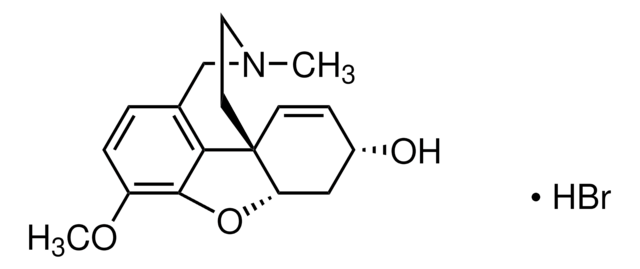C7512
Butyrylcholinesterase from equine serum
lyophilized powder, ≥10 units/mg protein
Synonym(s):
Acylcholine acyl-hydrolase, Choline esterase, butyryl, Pseudocholinesterase
Sign Into View Organizational & Contract Pricing
All Photos(7)
About This Item
Recommended Products
form
lyophilized powder
specific activity
≥10 units/mg protein
mol wt
tetramer 440 kDa
composition
Protein, ≥60%
solubility
cold water: 60 U/mL
storage temp.
−20°C
Looking for similar products? Visit Product Comparison Guide
General description
Butyrylcholinesterase (BChE) is a serine hydrolase that is structurally similar to acetylcholinesterase (AChE), but differs in substrate specificities and inhibitor sensitivities. The enzyme is a tetrameric glycoprotein with four equal subunits (110 kDa each). It is also termed as pseudocholinesterase. It is produced in the liver. It is found in blood, the synapse of neuromuscular junctions and glia cells and axons of white matter.
Application
Butyrylcholinesterase from equine serum has been used in a microcalorimetric study of the inhibition of butyrylcholinesterase by paraoxon. This enzyme has also been used in a study to investigate the synthesis and inhibition of cholinergic enzymes. Selective inhibition of BChE activity can be used in the detection of organophosphates. Its use in the treatment of organophosphate toxicity has shown clinical potential, as there is a correlation between the blood level of BChE in humans and the degree of protection against toxic nerve agents. There has also been an interest in the roles of cholinesterases with regard to Alzheimer′s disease. Investigations into selective inhibitors may provide a clearer picture of the physiological role of BChE in both healthy and diseased individuals. This product has been used for the screening of cholineesterase inhibitors in selected fruits and vegetables, for restoring cognitive function and improving memory. It has also been used to develop a butyrylcholinesterase and choline oxidase immobilized bio-sniffer for the detection of nicotine. Nicotine inhibits BChE activity. A decrease in the byproducts of BChE activity reflects the volume of nicotine.
Biochem/physiol Actions
Butyrylcholinesterase (BChE) can, unlike AChE, efficiently hydrolyze larger esters of choline such as butyrylcholine and benzoylcholine. The enzyme is activated by Ca2+ and Mg2+ and the activity is constant over the pH range 6.0-8.0. It is inhibited by betaine, nicotine, organophosphates, and carbamates.
Mutations in butyrylcholinesterase (BChE) gene results in the failure of respiratory system, prolonged paralysis and apnea.
Unit Definition
One unit will hydrolyze 1.0 μmole of butyrylcholine to choline and butyrate per min at pH 8.0 at 37 °C. The activity obtained using butyrylcholine as substrate is ~2.5 times that obtained using acetylcholine.
Physical form
Lyophilized powder containing buffer salts
Preparation Note
This product is prepared from equine serum using ammonium sulfate fractionation and supplied as a lyophilized powder.
Analysis Note
Protein determined by biuret
inhibitor
Signal Word
Danger
Hazard Statements
Precautionary Statements
Hazard Classifications
Resp. Sens. 1
Storage Class Code
11 - Combustible Solids
WGK
WGK 3
Flash Point(F)
Not applicable
Flash Point(C)
Not applicable
Personal Protective Equipment
dust mask type N95 (US), Eyeshields, Gloves
Choose from one of the most recent versions:
Already Own This Product?
Find documentation for the products that you have recently purchased in the Document Library.
Customers Also Viewed
Screening for cholinesterase inhibitors in selected fruits and vegetables.
Szwajgier D and Borowiec K
Biotechnology, 15(2) (2012)
Toxicokinetics of Chemical Warfare Agents: Nerve Agents and Vesicants
Handbook of Toxicology of Chemical Warfare Agents, 755-790 (2009)
Population-scale genomics-Enabling precision public health
Advances in Genetics, 103, 119-161 (2019)
Determinants of intracellular pH in the erythrocyte.
J Warth et al.
British journal of haematology, 29(3), 369-372 (1975-03-01)
Siti Munirah Mohd Faudzi et al.
Archiv der Pharmazie, 354(1), e2000161-e2000161 (2020-09-05)
A new series of pyrazole, phenylpyrazole, and pyrazoline analogs of diarylpentanoids (excluding compounds 3a, 4a, 5a, and 5b) was pan-assay interference compounds-filtered and synthesized via the reaction of diarylpentanoids with hydrazine monohydrate and phenylhydrazine. Each analog was evaluated for its
Our team of scientists has experience in all areas of research including Life Science, Material Science, Chemical Synthesis, Chromatography, Analytical and many others.
Contact Technical Service







